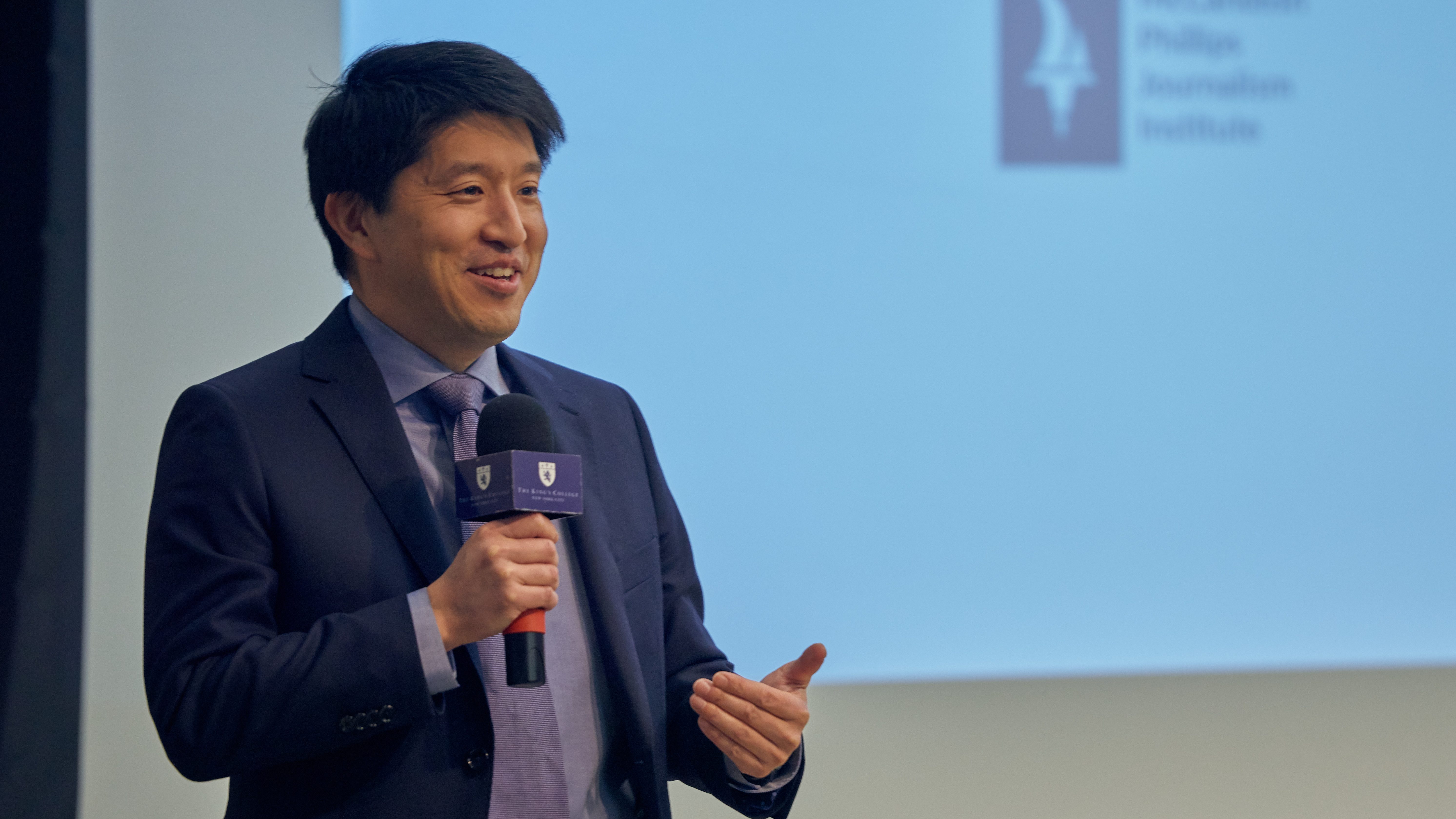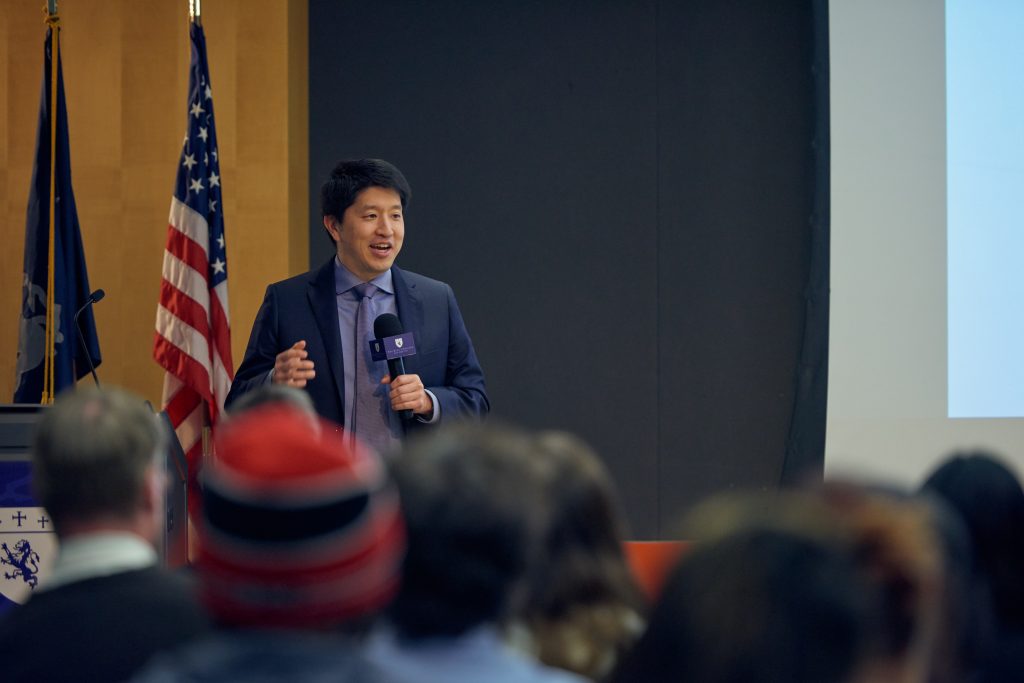MPJI Hosts Washington Post Editor David Cho
“I don’t bring to the Post any particular agenda,” David Cho said. “The job always asks you to put your personal agendas aside and just report exactly what you see.”

Washington Post business editor David Cho visited The King’s College on March 7 at the invitation of Professor Paul Glader, director of the McCandlish Phillips Journalism Institute. The event recognized current and graduated journalism students and featured a lecture by Cho on the unbiased pursuit of fact in journalism.
Cho entered the field of journalism reluctantly. “I do not like writing,” he admitted. “In fact, I never did anything in journalism until after I graduated college.” Feeling directionless, Cho moved to Korea to stay with some family members and accepted a copyediting job at the Korea Herald. After enduring the exhausting demands of a 60-hour work week and little compensation, however, Cho was offered the chance to cover an event on microprocessors as a reporter—not as a copyeditor—and he was published the next day. “That little article ended up opening a big door for me,” he said. He was given more opportunities to cover events, and based on those successes applied to Columbia University’s Graduate School of Journalism.
“When I got there, I was up against people who had been in the field for five or 10 years. I didn’t know what I was doing there,” he said. “I couldn’t stack up to all the people around me.” He declined an internship with the Detroit Free Press, ready to quit the field, when The New York Times offered him a copy-editing job at its foreign desk. After initially declining, Cho called on longtime friend and mentor John McCandlish Phillips for advice, who encouraged him wholeheartedly to “get his foot in the door.” So Cho accepted, and with a glowing recommendation from the Times’ copy editing chief Dave West, he moved on to a position at The Philadelphia Inquirer, The Newark Star-Ledger, and finally The Washington Post.

In journalism, Cho told the audience, editors “often ask you to do difficult tasks in an insanely short amount of time.” In the early 2000s, for example, Cho was given mere days to investigate the rise of gang activity in Fairfax—“a seemingly impossible task” for a “geeky Asian kid” with nothing in common with MS-13’s Hispanic gang leaders. He surprised his editor by excavating the sympathetic story of a couple of latchkey kids who were recruited to join the gang while still in their teens, all before the weekend was over. In another instance, Cho scored a coveted interview with legendary Redskins coach Joe Gibbs, who was coming out of retirement. By choosing to cover the unique religious angle of Gibbs’s story, Cho stood out among the hundreds of others who had requested an interview.
Cho also recounted his first breakthrough story with the Post—the aftermath of 9/11. As the wreckage from the crash burned in the days following the attack, Cho befriended several construction workers who were allowed access to the crash site near the Pentagon. He was also allowed inside the restricted area, where he remained for 30 consecutive hours. By a “unique accident,” Cho said, “I got the inside tale of what it was like to clear the rubble, to clear the bodies. When President Bush showed up at the scene, no other paper was able to get that.”
Cho credits these successes not to his own brilliance as a reporter but to his pursuit of truth. “I don’t bring to the Post any particular agenda,” he said. “The job always asks you to put your personal agendas aside and just report exactly what you see. I just follow what the facts are.” He attempts to cultivate the same ambition among his team, which now comprises 60 people: “I’ve hired a lot, but I’m trying to hire the best, no matter what their background is. There are far better journalists and far better leaders and managers than I am, but I feel humbled to be there. Our best ideas we come up with as a group, as a team.”
Cho’s position as business editor is no less demanding than his first job with the Korea Herald. “There are always 30 more issues than you can handle each day. You have to be willing to give up weekends and nights, and you have to do what it takes because you’re the last stop for that department. If people mess up, it’s on you.” Still, he said, “I feel very blessed to be there.”
Professor Glader reflected, “Dave possesses journalistic rigor as well as personal joy. His approach to journalism seems to be one of dogged pursuit of good stories and innovative experimentation around what works in building audience. I am so glad he spoke about this approach with our students and guests. It helps new journalists understand how to do hard-hitting and compelling journalism the way our friend John McCandlish Phillips did, but also to do so in ways that succeeds with new audiences.”
The lecture was followed by a Q&A session and was attended by King’s students and visitors.
David Cho holds a B.A. from Yale University and three master’s degrees from Columbia University. He has worked for the Post since 2001 and has overseen coverage that won a Pulitzer Prize for Public Service as well as a George Polk Award for Medical Reporting.




